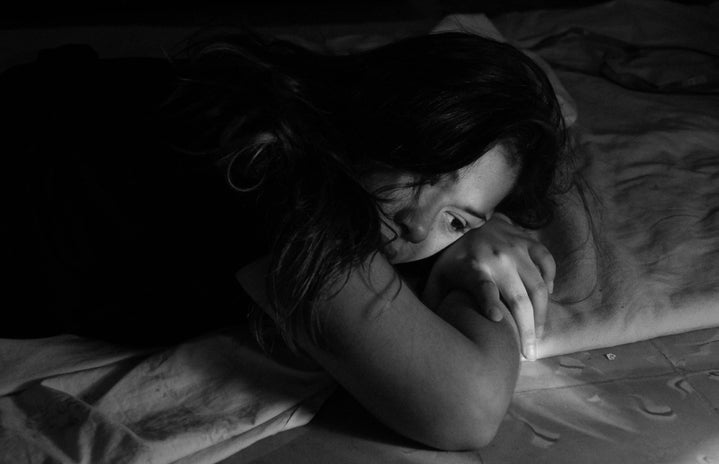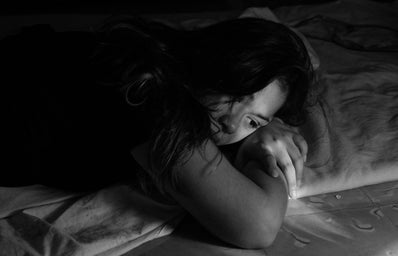I was in my freshman year of high school when the 13 Reasons Why television show hit Netflix and immediately became all the rage. The show, littered with addictive cliff-hangers, light political commentary, and soapy relationships, is about a high schooler who committed suicide and leaves a series of cassette tapes addressed to a certain person she blames for her depression.
Before I even processed how inherently problematic and potentially dangerous this concept is in it of itself, there was something odd about watching the show. As they trailed Hannah Baker’s spiraling depression and experiences with assault and bullying, her mental illness was dramatized, and she written to fit into every manic pixie dream girl trope ever: the “quirky” beautiful girl whose personality seems to revolve around a male protagonist’s self-growth and adventure. This is a classic tale of a tragic and horrific story being twisted to fit the male gaze.
13 Reasons Why is an extreme example of what I think is a larger cultural trend of portrayals of women at emotional rock bottom being utilized to serve what is known as the male gaze in and out of the context of cinema. I say in and out of the context of cinema because though originally and commonly the male gaze is employed to critique films, it is just as easy to observe its effects simply in everyday life because of our internalization of it. Whether or not we realize it, we have been taught to be in constant performance.

The male gaze stems from a theory by filmmaker Laura Mulvey, arguing that male viewers are target audiences in the industry, and thus portrayals of women are designed to fit patriarchal and heterosexual male fantasies. Women, therefore, become passive objects of male desire, and complex emotional stories, such as grappling with addiction, depression, or even just a shitty day, are reduced to this.
The idea that women must be presentable, manicured, beautiful, desirable, etc. whilst dealing with all of these things strips them of any character nuance, meanwhile failing to provide realist or well-written examples of what it’s like to actually hit “rock bottom.” When I have my bad days, I resort to an old t-shirt and probably don’t even shower. But you don’t usually see those things in mainstream T.V. You don’t see a growing collection of mugs by their bed, pajama pants they’ve been in for a week, or laziness. You don’t see them being humans.
But this phenomenon is not simply inaccurate. It’s also harmful. Mental illness is stigmatized, criminalized, blatantly ignored, and on top of it, consistently sexualized in the popular and even critically-appraised culture and art. Imagine how detrimental the effects of this are on consumers, especially young ones. We gain our worldviews from the content we watch, and when the objectification of female bodies is reinforced, we all internalize it, regardless of gender.
There is a massive amount of unlearning we all need to do and I include myself in that statement. I realized pretty recently that my own internalized male gaze was stronger than I thought. There are things I say I do “for myself” that aren’t really for myself—a constant image I feel I need to uphold to fit the standards of femininity asserted by male writers.
I mean, I think about the fact that I’ve had friends tell me they’re insecure about crying in front of other people because they’re ugly criers. Aren’t we all? And even if we weren’t, the fact that our presentation is the first thing that comes to mind in our most vulnerable moments is horrifying.

How to unlearn that is not a simple answer or even one that I have. Patriarchy and the gender binary goes far beyond television shows and crappy Y.A novels. The first step is recognizing how we uphold it within ourselves.
And, with that said, there are tons of good things coming out with nuanced depictions of mental illness. Find female writers—I May Destroy You and Fleabag are two musts that come to mind (especially as I May Destroy You just got completely ignored by the Golden Globes despite it being one of the most critically acclaimed television shows of the year).
I want to see a show about someone having a crappy day, or even a crappy year, and not looking good for anyone but themself. I want to see the ugly criers and the daunting stack of clothing on the floor because they can’t bring themselves to put it away. I want to see the stupid mistakes, I want to see the unbrushed hair and unbrushed teeth, I want to see them gorge out on terrible food and accidentally leave crumbs in their bed, I want to see their skin breakout.
I know this isn’t an easy fix. It’s hard to just say “hire more female writers” and pretend like the societally-constructed perceptions of ourselves will just fade away. But the first start is recognizing how it has impacted us, and then allowing us to act how we need to act in our worst moments. That is the art of radical self-care and love.


